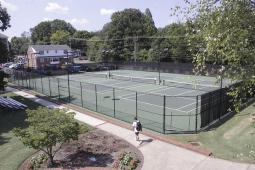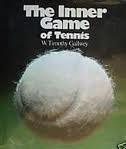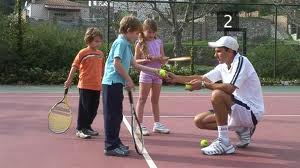Tennis federation wielding its power!
Tennis clubs belong to a National federation. You could argue that a lot of the elements you see in clubs are a result of federation policy. This policy is one hatched over several generations of organisation of clubs, but is heavily influenced by money and power coming from certain interested groups. It will operate a little bit like a political party, rubbing its hands when money is offered, ignoring anything that will cost time and energy, and not bring any guaranteed reward. It has very little interest in the good health of clubs, or the real needs of the population.
Unlike political parties the population has no choice in which federation to choose. There is only one. The senior officers of a federation are often senior administrators gleaned from the clubs. The president may well be a professional, that is he is paid to do his job, but very infrequently has he any direct experience of the professional game. They are frequently professional administrators, that is someone who has held local or national political office. He may have been involved in party politics, and will almost certainly have gained his position by political influence, that is to say, he has been vetted for his opinions, and these have been approved by the selecting committee.

Tennis clubs are all we've got
The general public is suspicious of politics and politicians. They are seen as corruptible, fickle and self-promoting. Our ideal of a poitician is one who serves his country's needs first, with honesty, proactivity and dexterity. How many politicians can you think of who have fitted this mould?

The tennis tournament referee - he does it his way
I was listening to the news yesterday and an important sporting committee has just lost one of its most influential members on its leading national committee. He didn't agree with the direction that his own committee was taking, their plans for development in particular. The plans involved conforming to a model imposed by a major sponsor. The sponsor comes to the table with a lot of money and says, I'll give you the money if you do it like this! This happens all the time on federations. A lot of money is involved, and very few people can resist money, and the consequential glow of satisfacton at being able to "attract" and "satisfy" a major sponsor.
Is this "corrupt"? It doesn't matter, because wherever you go in the world, in whatever sport, the same thing is going on. The needs of the people are largely ignored in any senior committee decisions. If a committee member doesn't agree with the direction his committee is taking, he has no choice but to resign, and spend the rest of his life gardening. Radical thinkers in our "democratic" world are quickly pushed out of the system.
The sponsor calls the tune
A federation does play a huge role in the life of a tennis player. I can give you just two examples from my own federation, the French one. The Federation is responsible for, amongst other things: -
. arbitration. Tennis matches in France are the strength of its federation. The all year round club match system works very well because all categories, except younger women and the older junior sections, are very strong. They deliver a structure that most of these players want to play in their clubs.
Every match officially has to be undersigned by a referee who has received a certificate from the federation for his refereeing competence. Once again this referee is a part-timer, maybe quite well versed in the rules, but not with the authority, experience or competence to deliver proper umpiring. In practice this referee is very uncommitted and unconcerned. He won't want to impose himself on a club match because frequently he is playing in it himself!

The tennis mind game
Let's say there has been a big argument in a club match. In theory the referee should step in and make sure that the match gets brought to a successful conclusion. In practice what happens is that the argument does not get diffused or punished as an umpire would do it on court. The resulting rankling can last for generations between clubs!
Or, there is one club locally where the local coach is the referee for all matches. He imposes strict rules on certain things at certain times, as he should do. Unfortunately because he is in a minority as a disciplinarian referee, he makes himself unpopular, and visiting clubs talk about his severity even before a ball is hit. But of course all referees should be doing what he does.
Federation classement system
Then there is another problem, this strict referee gets carried away by his own uncontrolled power. If you assess his performance you will see that he is strict on say four or five points, and ignores another twenty or thirty. No-one tests or evaluates him. The federation should, but doesn't. So, in arbitration, you get terrible inconsistencies.
The final consequence of all of this is that when you play a tennis match in France, you play against a player AND a referee. A typical French player knows that tournament refereeing is totally lax, so ends up by doing the job himself, on court. Frequently you don't exactly get in disputes on the court, but you have an opponent who reminds himself, spectators, opponents and anyone who is listening how a tennis match should be conducted. French players frequently are on a non-stop lookout for things to start nirgling about! Very very few players actually play the game in the right, open, sporting, fair spirit!
Winning = losing
Another federation issue - coaching qualifications. One thing I like about the French federation is to be able to earn money as a coach you must have a certain minimum playing level in the game. This minimum level is quite high, certainly much higher than any other federation I know. You may think that this will exclude many useful coaches from earning their living from the game, and you'd be right! But what does happen is that as a result of this policy, technical standards in France are rather high. Even lower ranked players learn how to play correctly sooner rather than later.
The unfortunate consequence of this policy is that these "good" players, who now have the authority to coach and earn money from the game, develop such a superiority complex that they spend most of their lives defending their incontestible knowledge and positions. I have direct experience of this.
I naturally have fulfilled the playing standard to be able to coach the game and earn money from it. In order to gain my French coaching certificate I have to pass a written test in tennis coaching, in French! They do this deliberately to protect the French coaches who "master" their language and jargon. It gives them a simple excuse for saying, this coach may have the right playing standard, but his language skills aren't good enough! The fact that I did a pro job for twenty years in Germany, at the same level, cuts no ice with them!
Who is your coach working for?
I tried to validate my USPTR qualifications in France twice, and twice it was refused, then I gave up! I later discoverd that in my region there are four coaches who have this higher certificate, and none of them work full time (they are all school teachers!). If I would have entered their patch, I would have been the only full-timer, so I was a huge threat to them. They were asked by the authorising federation how they viewed my candidature for the highest coaching certificate, and of course they all tutted and pulled faces. I had no chance!

Recognised USPTR qualifications
The two serious consequences of this "political" system being in place is that :-
. almost no foreign coaches are working in France
. the Level One coaching certificate is only fit for general animation of a physical activity class for young children, and certainly has no technical tennis value
. the pro level of coaches is an extraordinarily lazy and self-protective clique.
Has it occurred to the Federation that they might need to toughen up standards? Would they be able to if some committee radical decided to?
Your opinions are welcomed on workouttennis.com
Five of our most popular pages
. tournament win
. finding a sponsor
. the touring pro
. the master at work
